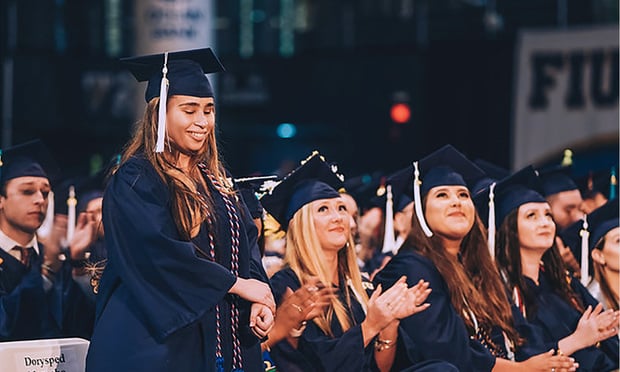Blind Student to Attend FIU Law School
Dory Mancebo overcame the odds and will be a law school 1L at FIU in the fall.
May 29, 2019 at 01:41 PM
3 minute read
 FIU law student Dory Mancebo. Photo: Florida International University.
FIU law student Dory Mancebo. Photo: Florida International University.
From the time she was born, Dory Mancebo had poor vision. She was born with a condition called iris coloboma, meaning there were holes in her irises. She completely lost her eyesight at age 14.
But in the fall, she will become a first-year student at Florida International University's College of Law.
“My mom always told me: Focus not on your problem but on helping others with their problems,” Mancebo said.
Mancebo's first true experience with the law came when she was still a teen—less than a year after she went completely blind. She was working with a United States immigration attorney to help secure a visa for her mother's friend, who wanted to visit her daughter in the U.S.
She helped gather documents, fill out forms. She accompanied her mother's friend to the U.S. consulate.
“She got her visa, and we traveled with her to the U.S. so she could see her daughter,” Mancebo said. “I said 'OK I think I found out what I was supposed to do. I want to be somebody who uses the law for a good purpose.'”
The experience carried her through college. This summer, Mancebo graduated summa cum laude from FIU with a double major in international relations and French.
Next stop: law school. She still wants to be an immigration lawyer. But after an internship at the Broward County Courthouse, family law has piqued her interest too.
Despite countless challenges, Mancebo is not the first blind student to attend law school. Isaac Lidsky became the first blind U.S. Supreme Court law clerk in 2008. Scott Greenblatt graduated from Florida State University in 2009. Richard Bernstein became the first blind Michigan Supreme Court Justice in 2015.
Mancebo's undergraduate years were characterized by frequent trips to the FIU Disability Resource Center (where she says she met “her biggest fans”) and long nights transcribing class lectures. Studying for the LSAT was similarly difficult. She couldn't diagram logic games or sentences. Her screen reader didn't account for bold words or pictures.
These challenges also are not new, although little has changed over time. The National Conference of Bar Examiners has been sued more than six times by blind and visually impaired plaintiffs. It was only in 2011, when Vermont law school student Deanna Jones sued the NCBE, that screen readers were allowed at all when taking the LSAT.
And despite her familiarity with FIU, law school will be a whole different animal, Mancebo said.
“It's going to be a learning process for both me and the school,” she said. “I will have to say what I need, what would work for me, what makes it easier, and listen to what the school needs and what they can give.”
But she's not nervous. She knows she has the backing of FIU, which has supported her through her undergraduate studies. Others have also affirmed their support. The other day, she got an email from Elisa D'Amico, president-elect of the Miami-Dade chapter of the Florida Association for Women Lawyers' president-elect
“She told me 'don't worry, we have your back.' That was so calming and at the same time so encouraging,” she said.
This content has been archived. It is available through our partners, LexisNexis® and Bloomberg Law.
To view this content, please continue to their sites.
Not a Lexis Subscriber?
Subscribe Now
Not a Bloomberg Law Subscriber?
Subscribe Now
NOT FOR REPRINT
© 2025 ALM Global, LLC, All Rights Reserved. Request academic re-use from www.copyright.com. All other uses, submit a request to [email protected]. For more information visit Asset & Logo Licensing.
You Might Like
View All
SEC Whistleblower Program: What to Expect Under the Trump Administration
6 minute read
Turning the Shock of a January Marital Split Into Effective Strategies for Your Well-Being
5 minute read
Latest Boutique Combination in Florida Continues Am Law 200 Merger Activity
3 minute read
South Florida Real Estate Lawyers See More Deals Flow, But Concerns Linger
6 minute readTrending Stories
- 1Public Notices/Calendars
- 2Wednesday Newspaper
- 3Decision of the Day: Qui Tam Relators Do Not Plausibly Claim Firm Avoided Tax Obligations Through Visa Applications, Circuit Finds
- 4Judicial Ethics Opinion 24-116
- 5Big Law Firms Sheppard Mullin, Morgan Lewis and Baker Botts Add Partners in Houston
Who Got The Work
J. Brugh Lower of Gibbons has entered an appearance for industrial equipment supplier Devco Corporation in a pending trademark infringement lawsuit. The suit, accusing the defendant of selling knock-off Graco products, was filed Dec. 18 in New Jersey District Court by Rivkin Radler on behalf of Graco Inc. and Graco Minnesota. The case, assigned to U.S. District Judge Zahid N. Quraishi, is 3:24-cv-11294, Graco Inc. et al v. Devco Corporation.
Who Got The Work
Rebecca Maller-Stein and Kent A. Yalowitz of Arnold & Porter Kaye Scholer have entered their appearances for Hanaco Venture Capital and its executives, Lior Prosor and David Frankel, in a pending securities lawsuit. The action, filed on Dec. 24 in New York Southern District Court by Zell, Aron & Co. on behalf of Goldeneye Advisors, accuses the defendants of negligently and fraudulently managing the plaintiff's $1 million investment. The case, assigned to U.S. District Judge Vernon S. Broderick, is 1:24-cv-09918, Goldeneye Advisors, LLC v. Hanaco Venture Capital, Ltd. et al.
Who Got The Work
Attorneys from A&O Shearman has stepped in as defense counsel for Toronto-Dominion Bank and other defendants in a pending securities class action. The suit, filed Dec. 11 in New York Southern District Court by Bleichmar Fonti & Auld, accuses the defendants of concealing the bank's 'pervasive' deficiencies in regards to its compliance with the Bank Secrecy Act and the quality of its anti-money laundering controls. The case, assigned to U.S. District Judge Arun Subramanian, is 1:24-cv-09445, Gonzalez v. The Toronto-Dominion Bank et al.
Who Got The Work
Crown Castle International, a Pennsylvania company providing shared communications infrastructure, has turned to Luke D. Wolf of Gordon Rees Scully Mansukhani to fend off a pending breach-of-contract lawsuit. The court action, filed Nov. 25 in Michigan Eastern District Court by Hooper Hathaway PC on behalf of The Town Residences LLC, accuses Crown Castle of failing to transfer approximately $30,000 in utility payments from T-Mobile in breach of a roof-top lease and assignment agreement. The case, assigned to U.S. District Judge Susan K. Declercq, is 2:24-cv-13131, The Town Residences LLC v. T-Mobile US, Inc. et al.
Who Got The Work
Wilfred P. Coronato and Daniel M. Schwartz of McCarter & English have stepped in as defense counsel to Electrolux Home Products Inc. in a pending product liability lawsuit. The court action, filed Nov. 26 in New York Eastern District Court by Poulos Lopiccolo PC and Nagel Rice LLP on behalf of David Stern, alleges that the defendant's refrigerators’ drawers and shelving repeatedly break and fall apart within months after purchase. The case, assigned to U.S. District Judge Joan M. Azrack, is 2:24-cv-08204, Stern v. Electrolux Home Products, Inc.
Featured Firms
Law Offices of Gary Martin Hays & Associates, P.C.
(470) 294-1674
Law Offices of Mark E. Salomone
(857) 444-6468
Smith & Hassler
(713) 739-1250






